- Home
- Brian Falkner
Cave Dogs (Pachacuta Book 1) Page 14
Cave Dogs (Pachacuta Book 1) Read online
Page 14
We had no idea where we were, but every now and then luck smiles upon you. Jenny recognised something about the seemingly featureless Nan, and said ‘That’s the path to the Chinkana.’
The Nan was deserted although we could hear voices in the distance, but there was no time to waste so we slipped quietly into the thoroughfare and made our way to the construction site.
I had expected to have to deal with two guards, but there were none. I thought luck seemed to be shining brightly that night. Actually I couldn’t have been more wrong.
Long poles on circular bases held clumps of shili crystals in the air, illumating the bat-farm-to-be. The dust cart had disappeared, along with one of the Rock-Eaters, but the other remained.
‘Where are the guards?’ asked Jason with a trace of concern.
‘Count your blessings,’ I replied.
Phil climbed into the huge machine and examined it. The controls were marked with the hieroglyphics of the Runa, but he traced a couple of them back to find out what they did. He had an ability, no doubt about that, for a couple of moments later there was a soft roar from deep inside the machine as the gas-fired boilers ignited.
Fizzer and Tupai were watching the entrance way for signs of our chasers.
Phil experimented with some levers and eventually got the machine to move, first backwards, then forwards. It rolled smoothly on large black wheels, not rubber, some hard substance, not unlike the material they made the battle armour from. There were three wheels on each side, and steering was like a tank, slowing one side turned the machine in that direction.
A little more playing around and the great discs began slowly to turn. Phil angled them downwards, then upwards.
I was quite surprised by the angle by which the discs could be adjusted. The upwards angle was almost forty-five degrees. On that angle, depending on how deep we were, we should reach the surface in quick thrift.
‘Someone’s coming,’ Fizzer hissed, and Phil quickly shut the machine down, while Jason cut off his light.
Footsteps outside, slowly approached the entrance to the cave. Too slowly, I thought, for Kuimata. There was no urgency to the sound.
A bright shili-crystal shone at the entrance. I ducked down behind the Rock-Eater with Jason and Jenny. Phil hunched over in the driver’s seat, while Tupai and Fizzer flattened themselves against the walls.
The figure entered, his face visible in the soft shili-light. It was Tukuyrikuq.
‘I thought I’d find you here,’ he said, and we slowly emerged from our hiding places.
He looked around slowly at our dripping robes and up at Phil on the Rock-Eater.
‘Magnificent piece of machinery,’ he said, and we all nodded. For some reason I felt embarrassed.
‘You said if we found a way back to the surface, to show you the way,’ Jason said. ‘Well, we’ve found a way.’
Tukuyrikuq snorted, a scoffing kind of a snort, ‘You’ve found a way. You think you’ve found a way out of here. I’ve been underground for eighty years, do you think that it never occurred to me to take one of these beasts for a ride.’
There was silence at that.
Phil said eventually, ‘It could work. The discs tilt upwards, and …’
Tukuyrikuq waved a hand for silence.
‘You’re wet,’ he said, ‘have you been swimming?
Jason nodded, ‘We found our way by accident into a huge underground lake. Not far from here.’
‘Ah,’ Tukuyrikuq smiled, ‘So you’ve finally met Tanepha-ha, the great serpent of Ukhu Pacha.
I nodded, but was conscious of Jenny’s small gasp beside me.
‘Tanepha-ha,’ she breathed, ‘Tanepha. Taniwha!’
Taniwha! The ‘dragon’ of Maori mythology. The ‘boogie-man’ that Maori mothers used to frighten their children.
Tukuyrikuq nodded. ‘She was known to the ancient Maoris, I am certain. Perhaps not Shi-urlu, the one you have just met, for there are many Tanepha-ha in the deep waterways of Ukhu Pacha.’
‘We’re not here to discuss sea-snakes,’ Phil said, ‘We don’t have time. We’ve got to get drilling before the Kuimata find us.’
Tukuyrikuq closed his eyes. He said, ‘For more than eighty years I have longed for the blue skies of my home. I would give all the gold and diamonds in Ukhu Pacha just to spend one afternoon lying in a grassy meadow watching clouds puff each other around the sky. I would give my life to see a single sunset, or to feel a soft breeze, and the rain on my face.’
He stopped and for once Phil did not intrude.
Tukuyrikuq continued, ‘For over eighty years I have lived with the knowledge that on any day, I could have stolen a mikhuy and drilled a path to the surface, I could have escaped from this rocky dungeon.
But I also knew that in doing so I would condemn these people to death. I would be responsible for the destruction of an entire civilisation. For once I had opened a path to the surface, the gwei-teri would come. Not the demons of myth with their fire-spears and deadly breath, but the gwei-teri of reality, with gatling guns and grenades.’
We let him speak unabated, despite the desperation of the hour.
‘Perhaps explorers would come first, scientists. The Runa would kill them as demons. Then would come the army, and nothing I could do would stop the fierce battles. The Runa would fight bravely, but they would fight, to the last man, woman or child. And they would be no match for the weapons of the surface
And you surface dwellers would have opened a passage to a world you could never have dreamed of. You would spread like a virus along the underground passageways. No underground people would be safe, not the Amori, not the Grypthi. All of it, gone, because I, in my selfishness, wanted to see a sunset.’
He stopped, breathing heavily as if the effort of speaking had exhausted him. I had no words. I had no argument to what he had said.
Phil did though, ‘Nice speech old man, but I’m not staying down here for the rest of my life.’ He started the boilers and a belch of steam emerged from the top of the Rock-Eater as it lurched forwards.
‘Stop!’ Jason said, and in his voice was a tone I had not heard before. It was the sound of command. It must have shocked Phil as well, as the machine lurched to a halt.
‘Bugger that,’ Phil shouted, ‘I’m leaving, you stay if you want to. But I’m going now before the guards get here.’
‘Where are the guards?’ asked Tukuyrikuq suddenly. ‘The guards for the mikhuy? I hope you have not hurt them!’
‘There were no guards,’ I said, ‘The cave was deserted when we arrived.’
Tukuyrikuq’s face creased in doubt, ‘There are always guards. These machines cannot be left unattended, for fear of …’ he broke off suddenly, listening. I heard it too, a scuffling noise from the passageway.
‘Maeroero!’ Fizzer cried.
‘Oh shit,’ Jason said, but it sounded like a prayer.
13. Death of a Mikhuy
By Jason Kirk
‘Can you steer that thing?’ I asked Phil urgently.
He nodded without looking at me, his eyes fixed on the passageway that led into the cave.
‘Then get it moving! See if you can block the entranceway with the cutting disc.’
The cutting disc was huge, able to create a tunnel wide enough and high enough for easy passage for people, even Moa-carts in a single pass.
Phil nodded his understanding and started fiddling with the controls. The Rock-Eater was about twenty metres away from the entrance and faced at almost ninety degrees to it. Under Phil’s coaxing it began to move, dragging itself around in a semi-circle to face the entrance.
The scuffling sound grew louder as the Maeroero neared the other end of the passageway, almost lost, though, beneath the wheezing steam, and the scraping rock noises of the mikhuy.
‘What weapons have we got?’ I asked, but realised that the others were way ahead of me, scouring the worksite, scavenging the few tools and odds and ends of construction equipment that remained.
Phil shouted down to me from the mikhuy seat, ‘I think I could make a catapult out of that dust-digger-wheel-thing.’
It was up against the far wall of the cavern. Some kind of automatic shovel, I had wondered about it, but realised that Phil was probably right, it was for loading the dust onto the dust carts.
I didn’t give it any serious thought, ‘No time! Is there any way to make that thing go any faster?’
‘Not that I can find!’ he called back.
‘Tukurikuq,’ I caught him by the arm. ‘You said the job of the guards was to alert the garrison. How?’
He had been silently standing, watching our efforts. He turned to me and his face was drawn, his eyes half-closed.
‘We must destroy the mikhuy,’ he said.
‘We’re going to try to block off the entrance.’
‘It won’t help.’
‘We think it will, and we’re going to try. We’re going to try and hold them off until help arrives, now tell me,’ my tone was harsh, brutal almost, ‘How do we warn the Runa?’
‘You don’t understand,’ the old man said, and his voice was pure, unadulterated despair, ‘Listen. Listen to the sound of the feet.’
I listened, but it sounded the same as it had before, only louder.
‘Listen,’ Tukuyrikuq cried, ‘This is not a raid, this is no war party. This is an army. There are hundreds of them!’
It occurred to me that if he was as scared as he was, then perhaps I should be also, but I didn’t have the time.
‘If they break through, and we can’t fight them off, then we’ll destroy the machine. I’ll do it myself. For now let’s just warn the Runa.’
‘The death of a Huinock Rumi Mikhuy is a terrible thing,’ Tukuyrikuq said, speaking of the machine as if it were a living being, but he began to walk towards a large crystal suspended from the roof of the cavern on a long reed. ‘In a cave this size the dying flesh of the mikhuy would eviscerate all other life. Anything that survived would endure the screaming death of the mikhuy’s dying breath.’
It was a terrible image. He spoke in pictures, yet I understood him perfectly. The explosion of the steam boiler would destroy the Rock-Eater, sending shards of shrapnel rocketing throughout the cave, ricocheting off the walls and roof. Nowhere in the cave would be safe. If somehow we survived that onslaught, we would be boiled alive by the super-heated steam, as invisible as it was deadly, that would instantly fill the cave from the ruptured boiler.
I hoped it didn’t come to that.
We reached the crystal and Tukuyrikuq grasped a small metal tuning rod hung by a hook from the reed that suspended the crystal. He rapped it against the wall of the cave and it started to vibrate. He held the rod near the crystal, moving it in and out slightly, watching the crystal carefully.
The crystal started to vibrate, then to hum. It was a low, deep-seated hum that I could feel in the base of my spine.
‘The warning has been sent,’ Tukuyrikuq said after a moment, ‘There are other crystals in Contisuyo which now sing in harmony with this one. The signal is sent.’
Clearly, and perhaps not surprisingly, the Runa people knew more about crystals and harmonics than we surface dwellers had ever dreamed of.
The gap had narrowed to fifteen metres when the scuffling noises ceased. The Maeroero, I realised, had reached the other end of the short passageway into our cave. Why they had stopped, I wasn’t sure, but it was a good guess that it was the sounds of the Rock-Eater rumbling towards the entrance. I think they had expected to find the cave empty, but that raised a whole new question. Why?
Flea and Jenny ran towards me, their arms full of long sturdy poles that looked like they were used for shoring up the roof. They were about the right diameter for bos but about twice as long.
Flea had also found an axe, and it took only a few seconds to trim the poles down to bo size.
I wasn’t sure how effective they’d be against the long knives of the Maeroero, but it was the only weapon we were familiar with, so they were surely our best bet.
Ten metres.
Daniel handed the bos around, and all took one except Tupai. He had found a couple of hammers, similar to sledge hammers but with short handles.
They seemed like children’s toys in Tupai’s beefy hands. I tried one, but could barely lift it.
‘Wouldn’t you rather have a bo?’ I asked. He had been to more bojutsu classes than I had.
‘Nah,’ he said, ‘I’ll leave that fancy stuff to you guys. In my street we learn hammer fighting even before we learn spade-fighting.’
I looked at Tupai’s eyes and realised that he was serious. I had known Tupai for most of my life, ever since primary school, we had grown up a few blocks from each other. We shared at least part of our cultural heritage, both of us having one Maori parent. And yet I felt more distant from him in that moment than I did from the Runa. I had never learned to fight with a hammer, and the thought appalled me. Maybe I had lived a sheltered life. And spade fighting!
He spun the hammers around in short circles, and seemed satisfied, with what exactly I don’t know.
‘Do you remember the way the warriors screamed as they attacked, when we were in the tunnel?’ he asked.
I nodded.
Tupai looked around the group to make sure we were all listening. He said, ‘When they attack, we charge at them, screaming like the warriors, at the top of our lungs. All of us, even you on the Rock-Eater, Phil.’
Phil looked down and nodded.
Tupai said, ‘Spread out, it will make it seem like there are more of us.’
We all nervously watched the entrance as we started to fan out around it.
Tupai said, ‘They don’t know who’s here, they don’t know how many of us there are. If we can convince them there is an entire army in here, they may back off.’
Tupai always knew the best way to avoid a fight, I thought.
Eight metres.
Jenny said hopefully, ‘Now that they know there is someone here, maybe they won’t attack at all.’
They attacked all right.
Jenny had scarcely finished speaking when there was a rapid scuffling from the entranceway and the first of the Maeroero burst through, jagged knives held high, long hair bristling, leaping over small boulders in the entrance, dodging around the sides of the approaching mikhuy.
Seven metres.
Tupai led the charge, but Flea was not far behind him. We ran, bos held high like spears, glinmering in the light of the shili. We ran, we screamed, whooping as best as we could like the warriors of the Runa.
The screams bounced and echoed around the huge cavern, and even I thought there were more of us than there really was.
The frontrunners of the Maeroero looked up at a wall of screaming, dark-skinned, alien warriors, fearlessly charging to the battle, and they faltered.
Tupai grabbed a new lungful of air and this time his cry was a tribal one, one that Maori warriors must have used in the early days of New Zealand as they ran into battle against each other or against the Pakeha settlers. Tukuyrikuq too added his voice to the storm of noise.
The Maeroero broke and ran back towards the safety of the tunnel.
Five metres.
Tupai stopped and picked up a rock the size of his fist and hurled it into the blackened entrance. There was a satisfying thwock as it hit something soft. Something that wasn’t part of the rock of the cave.
Flea was scrabbling around on the floor as well, and a second later all of us were hurling stones and small rocks into the entrance.
Four metres.
Three metres.
We moved to the sides of the mikhuy and continued to pelt the entrance with rocks. We were just hitting the walls now, judging from the sounds, but even that was enough to keep the enemy ducking for cover.
Two metres.
Scuffling sounds again as the Maeroero, urged on by a strident voice we could hear at the back, calling out commands in a language we had not heard before, rushe
d again towards our cave.
One metre!
Tupai was on my side of the Mikhuy. Flea, Jenny and Fizzer were on the other. I couldn’t see them, but I could see Tupai. The first Maeroero out of the gap was met by a barrage of hammer blows that knocked the knife from his grasp and physically hurled him back the way he had came, cannoning into the one behind him.
Just as the gap closed I could see them dragging away the limp body of the attacker. I doubted that he would take any further part in this battle.
Then the mikhuy crashed into the side of the rockface and the entrance was blocked. Almost blocked.
Phil had done his best. For someone who had never driven one of these machines before, in a darkened cave, with a battle raging around him, he had performed a small miracle.
What he hadn’t done was to slot the machine neatly into the tunnel.
The mikhuy was almost exactly the size of the tunnel, and had almost certainly drilled the tunnel, so it would fit through it, as long as it was lined up correctly.
With a shuddering jar that had reverberated around the cave, Phil had crashed one lip of the disc into the rock wall on the right of the tunnel. The unspinning blade-disc lurched drunkenly across the black maw of the entrance, blocking it quite effectively, with just a few centimetres of gap tracing a crescent moon down the left hand side.
‘How long before the cavalry gets here?’ Jenny asked.
Tukuyrikuq spoke from the rear of the cave, ‘They’ll find us soon. I just hope it is soon enough.’
Phil climbed awkwardly down from the mikhuy, putting no weight on his damaged leg, and narrowly avoided taking a short spear in his back that shot through the gap between machine and cave with an (almost) deadly accuracy.
‘Keep away from the left side of the Rock-Eater,’ I said, a bit belatedly. ‘We’re safe now. We’ll just sit it out until the Runa come.
As he spoke there was a thunderous crash from inside the entrance, and part of the rock wall to the left of the Rock-Eater, chipped and fell away under a heavy blow.
‘Or maybe not,’ he said slowly.

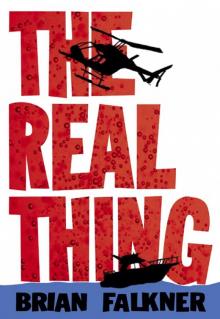 The Real Thing
The Real Thing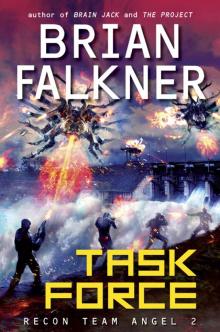 Task Force
Task Force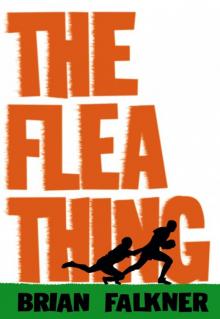 The Flea Thing
The Flea Thing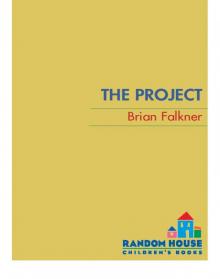 The Project
The Project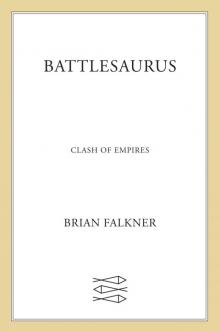 Clash of Empires
Clash of Empires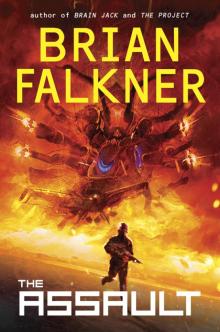 The Assault
The Assault Brain Jack
Brain Jack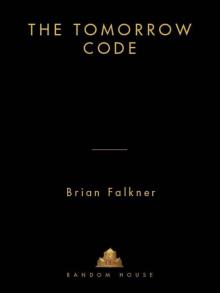 The Tomorrow Code
The Tomorrow Code Vengeance
Vengeance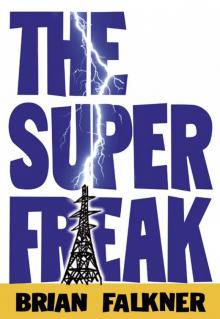 The Super Freak
The Super Freak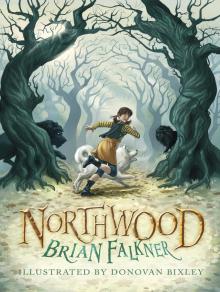 Northwood
Northwood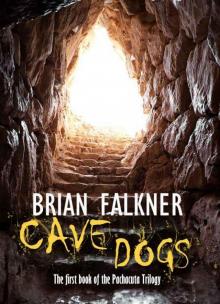 Cave Dogs (Pachacuta Book 1)
Cave Dogs (Pachacuta Book 1)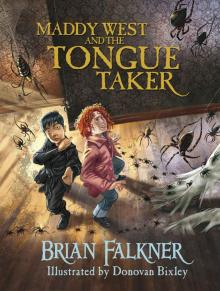 Maddy West and the Tongue Taker
Maddy West and the Tongue Taker